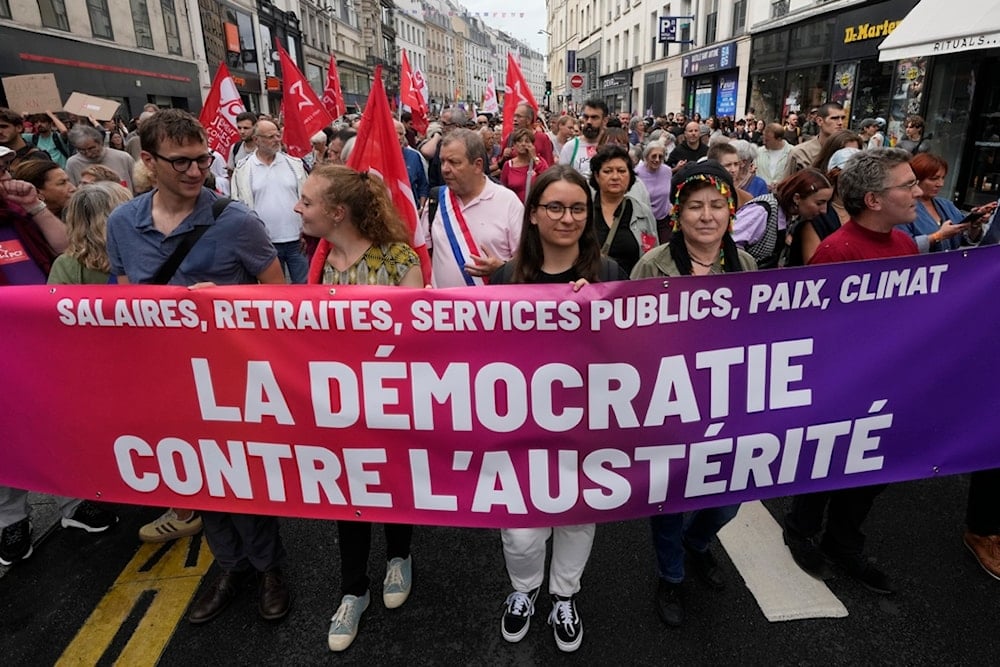Mass protests erupt across France over proposed 2026 austerity budget
Hundreds of thousands of protesters across France rallied under the "Block Everything" campaign to oppose the government’s 2026 austerity budget.
-

Demonstrators display a banner which reads 'democracy against austerity' during a protest, responding to a call from the far-left party, which criticized as a power grab the president's appointment of a conservative new prime minister, Michel Barnier, in Paris, France, Saturday, Sept. 7, 2024 (AP Photo/Michel Euler)
Hundreds of thousands of demonstrators took to the streets across France on Thursday to reject the government's proposed 2026 budget, which labor unions and opposition parties describe as a direct attack on social protections and workers' rights.
According to official figures, 195,000 people marched nationwide, including 24,000 in Paris, while the General Confederation of Labour (CGT) reported participation of over 600,000, reflecting the deep public anger surrounding the government's fiscal agenda.
The demonstrations mark the latest escalation in a wave of mobilizations against austerity, with citizens demanding greater transparency and social dialogue on budget policies they believe will deepen inequality and undermine essential services.
📢Encore une grosse manif à Marseille aujourd'hui. Toujours là pour défendre les travailleurs, les précaires, les services publics, la santé, nos retraites...
— Jeremy Bacchi (@JeremyBacchi) October 2, 2025
Contre l'austérité et pour la justice sociale et fiscale.
On continue la lutte !#budget2026 pic.twitter.com/bYLlAg7cts
Expanding Unrest Across France
Thursday’s rallies follow two major national protests earlier in September. On September 18, mass demonstrations swept the country as more than half a million people, according to the Interior Ministry, and over one million, according to unions, rallied against the proposed cuts.
Days earlier, on September 10, some 200,000 protesters had joined over 700 coordinated actions under the slogan "Block Everything" (Bloquons Tout), a grassroots campaign launched by labor unions and activist groups calling for nationwide strikes to paralyze the economy until the government abandons its austerity agenda. The movement targeted key sectors including transport, education, healthcare, and energy, urging workers to "bring France to a standstill" in defense of social welfare.
Several of these demonstrations turned tense, with clashes breaking out in major cities such as Paris, Lyon, and Marseille, leading to hundreds of arrests. Despite the confrontations, unions hailed the turnout as proof of growing unity among workers, students, and civil servants opposed to the spending cuts.
🔴 PARIS — HONTE 🔴
— Bloquons Tout ! (@bloquonstout) October 2, 2025
🔥 Répression en cours contre les lycéens de Turgot, partis en manif sauvage !
⚡ La police les poursuit jusque dans un Franprix pour les contrôler un par un… des gamins, traités comme des criminels.
👉 Voilà la réalité de leur “démocratie” : frapper la… pic.twitter.com/15ldlvrPFm
The protests have since spread to multiple sectors, disrupting transportation networks, closing schools, and shutting down major landmarks like the Eiffel Tower, as discontent over the draft budget continues to build.
Controversial Budget Under New Leadership
The 2026 austerity blueprint was originally drafted by former Prime Minister François Bayrou, who was ousted in a no-confidence vote on September 9. His successor, Prime Minister Sébastien Lecornu, has pledged to maintain the deficit-reduction targets, aiming to lower the shortfall to 4.7% of GDP in 2026, slightly revised from Bayrou's 4.6%, while ruling out the return of a wealth tax, a key demand of unions and the left.
Under the proposal, France would slash €43 billion from public spending, including €5 billion in healthcare, €5.3 billion in local government budgets, and a freeze on pension and benefit increases previously linked to inflation. Meanwhile, the defense ministry is set to receive an additional €3.5 billion, a move that protesters say reveals the government's misplaced priorities.
Finance officials argue the plan is essential to bring public debt under control and maintain investor confidence. Yet critics say it transfers the cost of fiscal discipline onto working families, while leaving major corporations and high-income earners relatively untouched.
Read more: Marine Le Pen pressures Macron as calls for French election grow
Widening Social Divide
Union leaders have condemned the austerity drive as "socially destructive", warning it will worsen living standards already strained by inflation and stagnant wages. The CGT and CFDT, France's two largest labor federations, have vowed to continue nationwide mobilizations, calling for an alternative budget focused on public investment, wage increases, and fairer taxation.
Opposition lawmakers have joined the chorus of criticism, accusing the government of pursuing "Brussels-style austerity" dictated by European deficit targets. Many protesters see the budget as a symbol of economic injustice, arguing that it rewards military spending and elites at the expense of social cohesion.
As Lecornu faces his first major political test since taking office, analysts warn that the unrest could become the largest social confrontation since the pension reform protests of 2023, signaling a potential winter of discontent for France's new government.

 4 Min Read
4 Min Read








